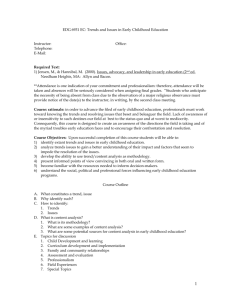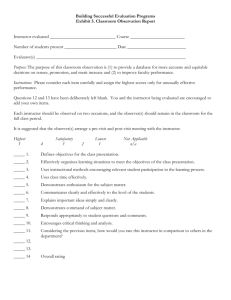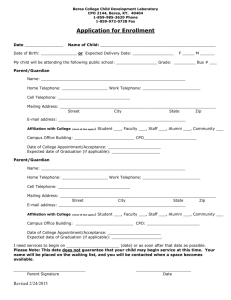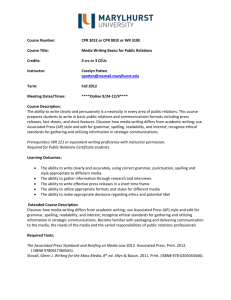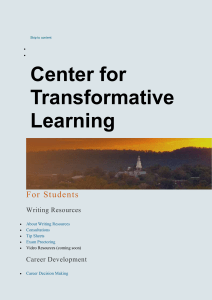eng 450-74 & 635-71 denmark 06
advertisement
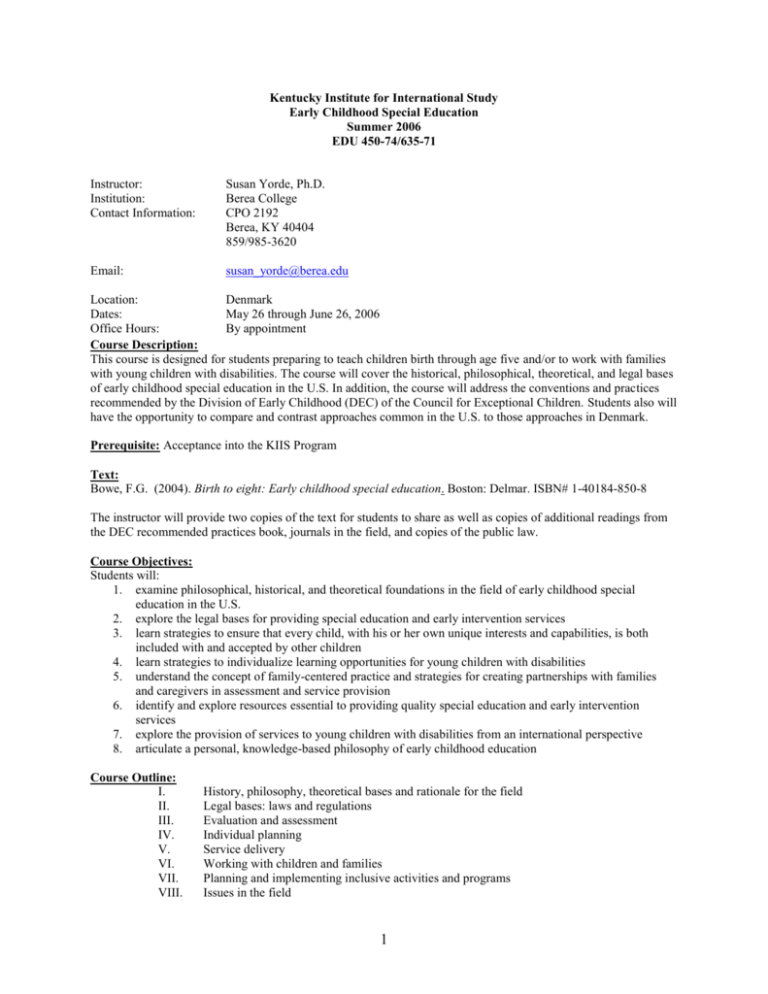
Kentucky Institute for International Study Early Childhood Special Education Summer 2006 EDU 450-74/635-71 Instructor: Institution: Contact Information: Susan Yorde, Ph.D. Berea College CPO 2192 Berea, KY 40404 859/985-3620 Email: susan_yorde@berea.edu Location: Denmark Dates: May 26 through June 26, 2006 Office Hours: By appointment Course Description: This course is designed for students preparing to teach children birth through age five and/or to work with families with young children with disabilities. The course will cover the historical, philosophical, theoretical, and legal bases of early childhood special education in the U.S. In addition, the course will address the conventions and practices recommended by the Division of Early Childhood (DEC) of the Council for Exceptional Children. Students also will have the opportunity to compare and contrast approaches common in the U.S. to those approaches in Denmark. Prerequisite: Acceptance into the KIIS Program Text: Bowe, F.G. (2004). Birth to eight: Early childhood special education. Boston: Delmar. ISBN# 1-40184-850-8 The instructor will provide two copies of the text for students to share as well as copies of additional readings from the DEC recommended practices book, journals in the field, and copies of the public law. Course Objectives: Students will: 1. examine philosophical, historical, and theoretical foundations in the field of early childhood special education in the U.S. 2. explore the legal bases for providing special education and early intervention services 3. learn strategies to ensure that every child, with his or her own unique interests and capabilities, is both included with and accepted by other children 4. learn strategies to individualize learning opportunities for young children with disabilities 5. understand the concept of family-centered practice and strategies for creating partnerships with families and caregivers in assessment and service provision 6. identify and explore resources essential to providing quality special education and early intervention services 7. explore the provision of services to young children with disabilities from an international perspective 8. articulate a personal, knowledge-based philosophy of early childhood education Course Outline: I. II. III. IV. V. VI. VII. VIII. History, philosophy, theoretical bases and rationale for the field Legal bases: laws and regulations Evaluation and assessment Individual planning Service delivery Working with children and families Planning and implementing inclusive activities and programs Issues in the field 1 Course Expectations: 1. Attendance. Students are expected to attend each class meeting and field experience. Promptness is an expected professional behavior. In the event that an absence occurs due to illness or unforeseen circumstances, students are expected to contact the instructor in advance of class or as soon thereafter as possible. 2. Preparation and participation. Students are expected to prepare for each class meeting by reading assigned materials and completing assignments. Students are responsible for all notes, handouts, and material presented when absent regardless of reason. All assignments are due at the beginning of the class session on the date given in the weekly calendar or announced by the instructor. Students are expected to refrain from note passing, side conversations, and other behaviors that could be distracting to others. Cell phones should be turned off. 3. Field Experience. Students will visit a variety of schools and programs in Denmark, complete a stay with a host family, and have the opportunity to visit museums, castles, parks, and other sites of interest in order to gather information and experience Danish culture, history, and daily life. Students are expected to participate in all field experiences associated with the trip and the course. 4. Academic honesty and plagiarism. Students are expected to do their own work. Representing the ideas of another as one’s own is considered a serious academic offense whether intended or not. In cases of cheating or plagiarism, students will, at a minimum, earn a grade of zero on the assignment; no make-up work will be provided. Students may be expelled from the course for cheating or plagiarism. Students are directed to the Berea College website for additional information about plagiarism: (http://www.berea.edu/library/factsonplagiarism.html ). 5. Computers and internet access. Students definitely will have access to computers and the internet at the Neils Steensen Gymnasium in Copenhagen and possibly other schools on the itinerary. 6. APA format. Students are expected to use APA format in all written work requiring references and in-text citations. 7. Adjustments. The instructor reserves the right to adjust course requirements and/or the weekly calendar as deemed necessary. 8. Accommodations. Students who require special academic accommodations in order to participate in this course should complete the following sequence of steps. First, the student should secure appropriate documentation through their designated college or university office, and then make an appointment with the instructor to share the documentation and discuss the accommodation. Grading Criteria The instructor will provide an explanation of each of the assignments listed below. Assignment Tests 2 @ 100 points each Field Experience Journal Philosophy Statement Discussion Leadership Total Points Grade Range: 90-100% 80-89.9% 70-79.9% 60-69.9% Less than 60% Points 200 100 50 100 450 A B C D F Grade Definitions Final grades for the course will be earned through a combination of earning points on assignments and displaying behaviors and dispositions toward learning, group process, and problem solving as described below. The grade of A signifies consistently outstanding achievement in all aspects of the course and assignments. Students who work to earn a grade of “A” will demonstrate all of the behaviors and dispositions described below 2 (grades B and C) and they will contribute to class morale through not complaining to the group, but using constructive criticism to solve problems. They will demonstrate depth of thinking through active participation in course discussions, take initiative to be group leaders during classes, on field excursions, and with logistics of study abroad experiences (in other words, helping to facilitate the group process). The grade of B reflects work of good to very good quality. Work at this level often has outstanding characteristics but is not as consistent throughout the term or in all aspects of the course. Students who work to earn a grade of “B” will achieve all of the behaviors and dispositions described below (grade C). In addition, they will demonstrate an in-depth level of thinking and processing of reading materials and program experiences. And, students will demonstrate leadership skills through their willingness to cooperate with instructors and peers to coordinate learning experiences that benefit the entire group. They will demonstrate consideration for study abroad companions and act in an inclusive manner to maintain a positive, supportive study abroad environment for all individuals. The grade of C denotes an acceptable level of competence. Students will demonstrate a basic understanding of course material and abilities sufficient to proceed to more advanced courses in the area. Students will be on time and attend all class sessions and field experiences related to the program. They will be prepared for class with texts and writing materials. They will complete all written assignments and presentations in a timely manner. In addition, they will demonstrate consideration for study abroad companions, host families, educational leaders, and site specific directors, staff, etc. They will accept responsibility for personal materials, daily family interactions (help if needed with preparation of foods, clean-up, and grocery shopping). This is especially important in Copenhagen. We will have a chef to prepare meals, but we will need to help with setting tables and clean-up. While in Odense, students will want to demonstrate appreciation for host families by helping as needed and appropriate. At the sports school in Viborg, students will need to respect the resident students and faculty through sharing computer use time and leisure time space. The grade of D indicates work that is minimally adequate. This grades raises serious concerns about the readiness of a student to continue in related coursework and to participate in future study abroad opportunities. The grade of F represents work that is unsatisfactory and unworthy of credit 3
